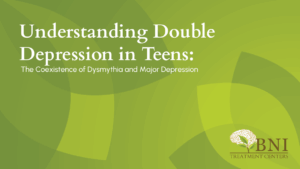High school is all about socializing. Finding new friends, joining clubs, and attending events are high points that most teens enjoy. Teens who suffer from social anxiety, however, are terrified of social situations and will avoid them at all costs. So, how does a teen survive high school with social anxiety?
What Is Social Anxiety?
All teens might feel a bit of apprehension before they arrive at a party or dance. It is normal to feel a bit of anxiety, which can be a mix of fear and excitement before events. A teen may worry if they’re dressed right for the event, or if they will know anyone there. There are lots of reasons a teen may feel a bit nervous about the social scene.
Social anxiety, however, is a much more intense response to being in a social setting. Teens with social anxiety have a heightened fear response when attending, or even thinking about attending a social event. They have an intense dread of possibly being rejected by their peers, or ridiculed and judged by them at best.
Social anxiety becomes impairing when the fear prevents the teen from participating in normal social events in high school. While most teens look forward to attending school sporting events, dances, or joining clubs, teens with social anxiety prefer isolation. The result is that the teen may become lonely and depressed, which can lead to even more mental health problems.
What Are the Signs of Social Anxiety?
Teens who have an intense fear of being publicly judged or embarrassed will display certain signs and symptoms of anxiety. Parents can watch out for these warning signs of social anxiety in their teenager:
- The teen avoids social situations or events as much as possible.
- They worry well in advance of the event, even becoming sick with worry.
- The teen avoids joining extracurricular activities.
- They are easily embarrassed.
- The teen exhibits anxiety prior to a social event, such as shaking, sweating, nausea, or shortness of breath.
- They prefer being alone instead of joining a group of peers.
- The teen is fearful of being judged on their appearance.
- The teen may be lacking in social skills.
- They are very self-conscious and self-critical.
- The teen is fearful of saying the wrong thing or appearing stupid.
- They might exhibit symptoms of depression.
- The teen may engage in substance abuse.
- They may express suicidal thoughts.
5 Ways Social Anxiety Hinders the High School Experience
The teen years are an important developmental chapter in life. It is the period when kids begin to develop social skills among their peers that will help them in adulthood. Adults must be comfortable going to a job where they will interact with coworkers.
Many times there are required social events to attend at work, or just in daily life. Weddings, funerals, baptisms, and holiday gatherings are just some of the typical social situations that adults are expected to attend. The teen years prepare us for this, and we practice while we are in high school.
Some ways that a teen’s high school years are impacted by social anxiety include:
- Causes loneliness. Teens who opt to stay home versus joining peers at social events end up feeling lonely and depressed. They are sad they missed out on the fun, but aren’t willing to risk exposure to the perceived criticism.
- Impacts grades. Teens that fear getting up in front of the class to deliver a report or project may stay home from school on those days. By not participating in the assignments their grades are impacted.
- Missing out on special events. High school is full of milestones that people will cherish their whole lives. By missing out on these once in a lifetime events, the teen can never make them up in the future.
- Impacts college aspirations. Most colleges like to see extracurricular activities listed on an application. They prefer applicants that participate in team sports, clubs, or charitable events.
- Thwarts normal development of coping skills. When a teen avoids situations where they may be judged or criticized, they miss out on normal development. We develop coping skills by learning how to deal with criticism or embarrassment.
How to Survive High School With Social Anxiety
To survive high school with social anxiety, the teen may need some help from a mental health expert. The goal will be to work with the teen to help him or her slowly overcome their fears. Practicing some exercises each week, they are able to build up their coping skills and better manage their fears.
Some teens may not find relief through working with a local counselor or therapist. They may benefit from a more intensive or structured teen anxiety treatment program. There are different levels of care that are offered for teens with social anxiety. These include:
Outpatient programs. Outpatient treatment is offered in two levels of care: intensive outpatient program and partial hospitalization program. These programs engage the teen in therapies and other activities 3-5 days a week.
Residential programs. Residential treatment provides a higher level of care, as the teen resides at the treatment center for the duration of social anxiety treatment. They will engage in the following activities:
- Individual psychotherapy sessions. One-on-one talk therapy sessions allow teens to explore their social anxiety struggles with a professional within a supportive space.
- Peer group sessions. Gathering with peers to discuss personal experiences and struggles allows the teen to practice overcoming the fear of rejection.
- Family therapy sessions. Treatment programs focus on family dynamics and education for better therapeutic outcomes.
- Life skills. Teens are taught new coping skills and also learn some social skills while in treatment.
- Experiential and holistic activities. Teens show a higher level of treatment participation when they are actively engaged in physical movements, such as walking, hiking, or outdoor sports. Yoga and meditation can help with student stress reduction.
- Academic support. While teens are in the residential treatment they are assigned an academic tutor to help them continue their schoolwork.
BNI Treatment Centers Helps Teens With Social Anxiety
BNI Treatment Centers offer outpatient and residential treatment for teens who struggle with social anxiety. Teens that wonder how to survive high school with social anxiety really want more than to just survive. They desire and deserve a fulfilling high school experience. If your teen is struggling with social anxiety, please reach out to our team today at (888) 522-1504.



